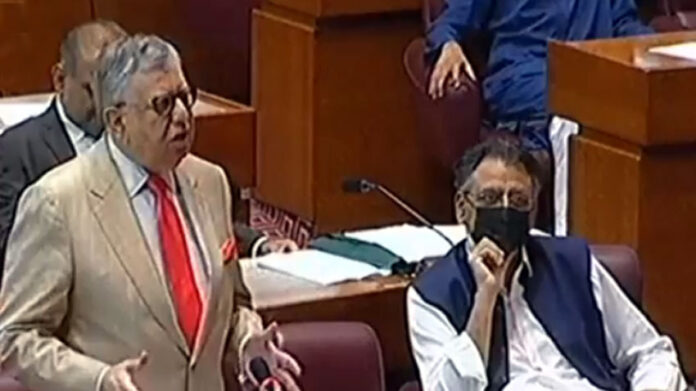ISLAMABAD: A key session of the National Assembly session in Islamabad to vote on the proposed budget for the fiscal year 2021-2022 (FY22) has passed the proposed budget for, Radio Pakistan reported.
Prime Minister Imran Khan was present for the session, while former president and Pakistan People’s Party co-chairperson Asif Ali Zardari and party’s chairman Bilawal Bhutto-Zardari were also in attendance.
The government rejected amendments to the finance bill proposed by opposition parties — wherein those proposed by opposition members have been rejected with a majority vote of 172-138 — but has accepted all those suggested by treasury MPs.
After the clause by clause reading was completed, a voice vote was conducted by the NA speaker and the budget was passed.
The opposition did not challenge the voice vote as they knew they did not have the required numbers.
The session was adjourned till Wednesday.
During the session, the opposition MPs speaking on the document urged the government to focus on promoting education and controlling the explosive growth of the population.
They said such an effective tax regime should be evolved to reduce the burden on the public.
The parliamentarians further sought relief for the public and said that incentives be given to the agriculture sector in order to bolster production.
Taking the floor, Minister for Finance Shaukat Tarin earlier in the session said the targets set in the budget will be achieved in the said period.
He said it was the first budget that provided a roadmap to help four million poor households out of poverty by provision of interest-free loans. He said these people will also be provided with healthcare cards and equipped with skills.
Tarin also said the inflation stood at seven percent. He acknowledged that the prices of food items have increased in the incumbent government but said it has happened so because the agriculture sector was ignored in the past.
He said the government was spending Rs62 billion for the uplift of the sector. He said we were also giving tax exemptions worth billions of rupees to farmers on fertilisers and pesticides.
He pointed out that the provincial governments were also spending on agriculture.
Tarin stressed that the tax-to-GDP ratio had to be brought to 20 percent to lift the economy.
He assured that the government did not believe in harassing the corporate sector but it will take strict action against wilful defaulters.
The government was able to beat the opposition in the vote on Tarin’s proposition.
Moreover, PPP leader Syed Khursheed Shah criticised the budget because of the addition of a multitude of taxes prior to the finance minister presenting it in the NA.
He estimated that the government had proposed taxes collectively amounting to around Rs1,100-1,200 billion.
The budget failed to meet expectations, he lamented, adding that a good budget ensured that people had food on their tables as “people’s wellbeing is symbolic of a good economy”.
The PPP leader also said that the health and education sectors remained largely ignored in the budget this time around as well.
He particularly expressed concern over the fast population growth in the country, raising doubts that the government had any plan to meet the demands of this fast-growing population.
The rapid population growth is an “atom bomb in the making”, he remarked, asking whether the finance minister considered this factor while devising the budget.
“We need to think of incentives to limit the population growth,” and the federal government should address the issue, he stressed.
He further said the government had failed to provide any relief to farmers in the budget.
“Please make this budget a budget for the people,” he implored.




